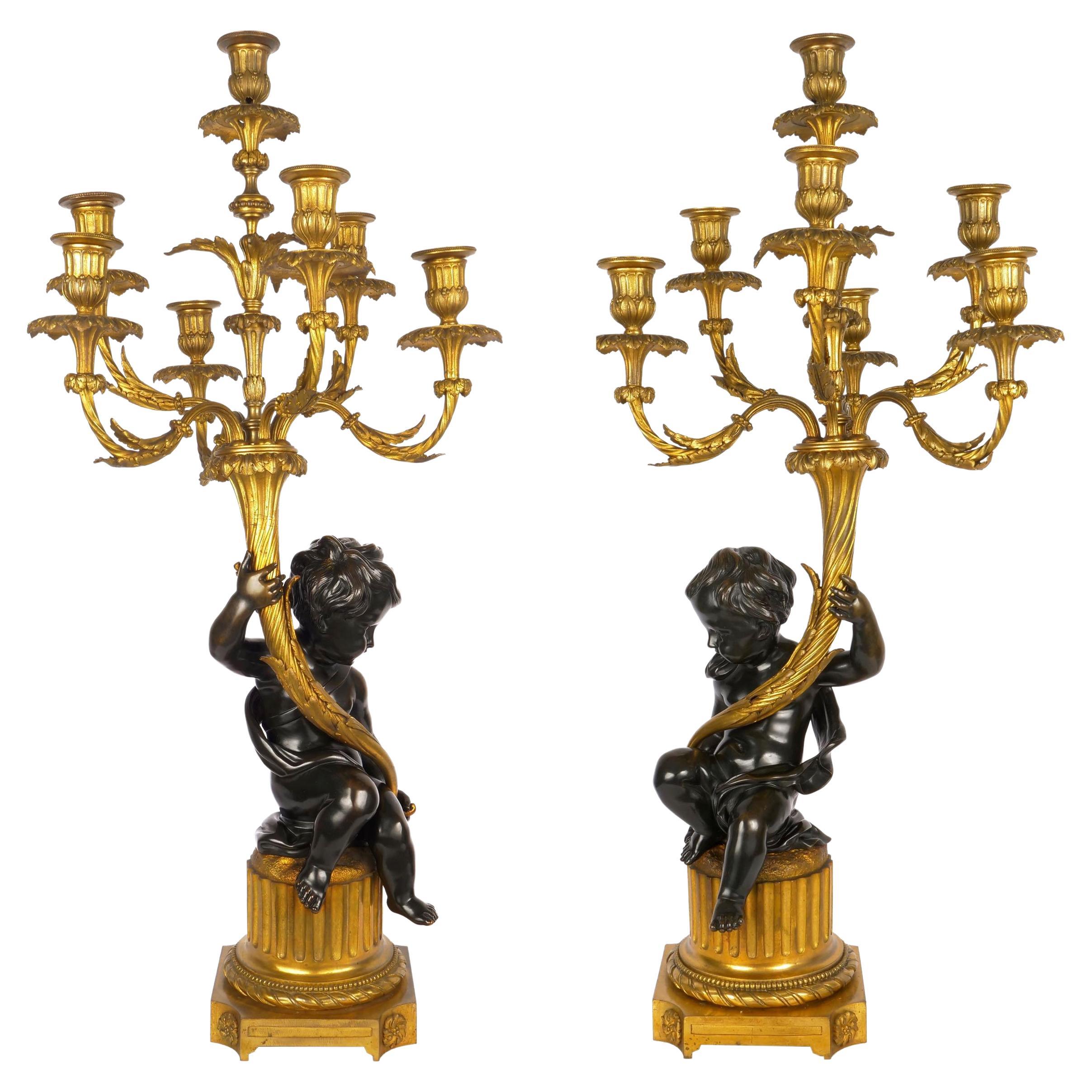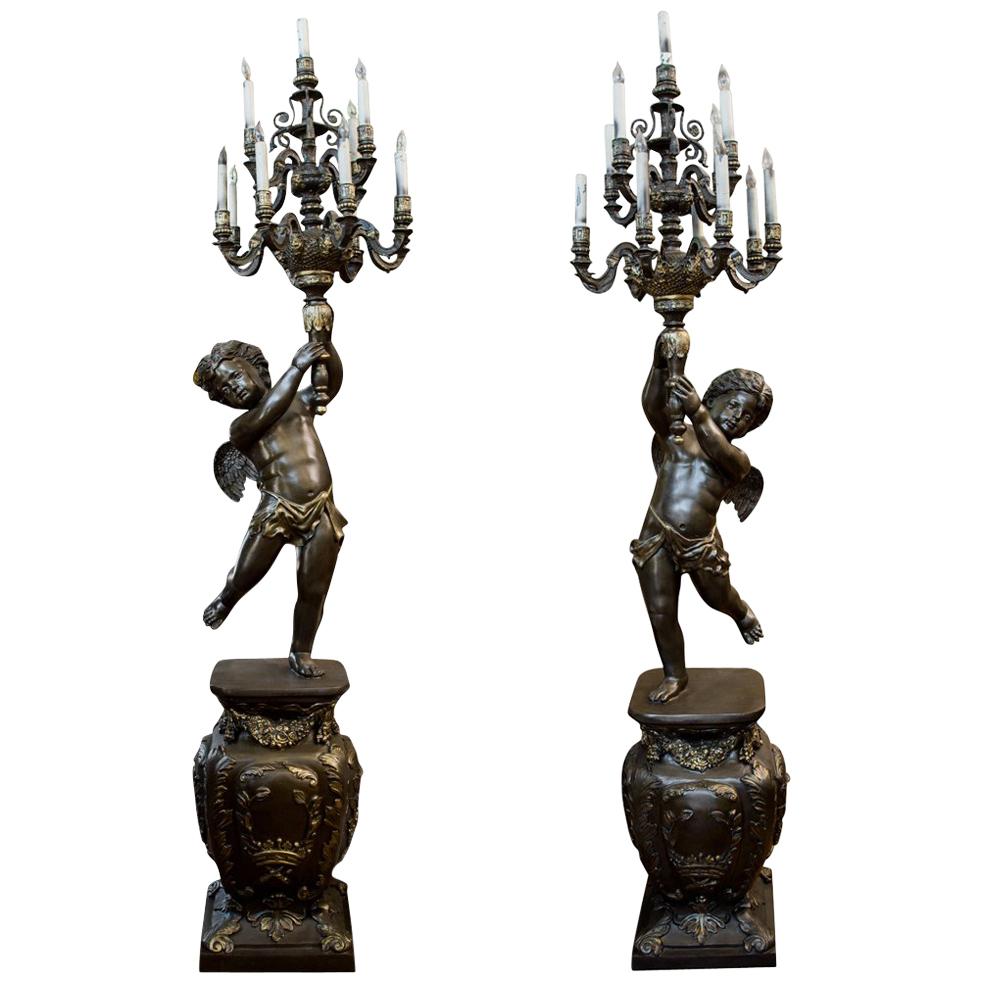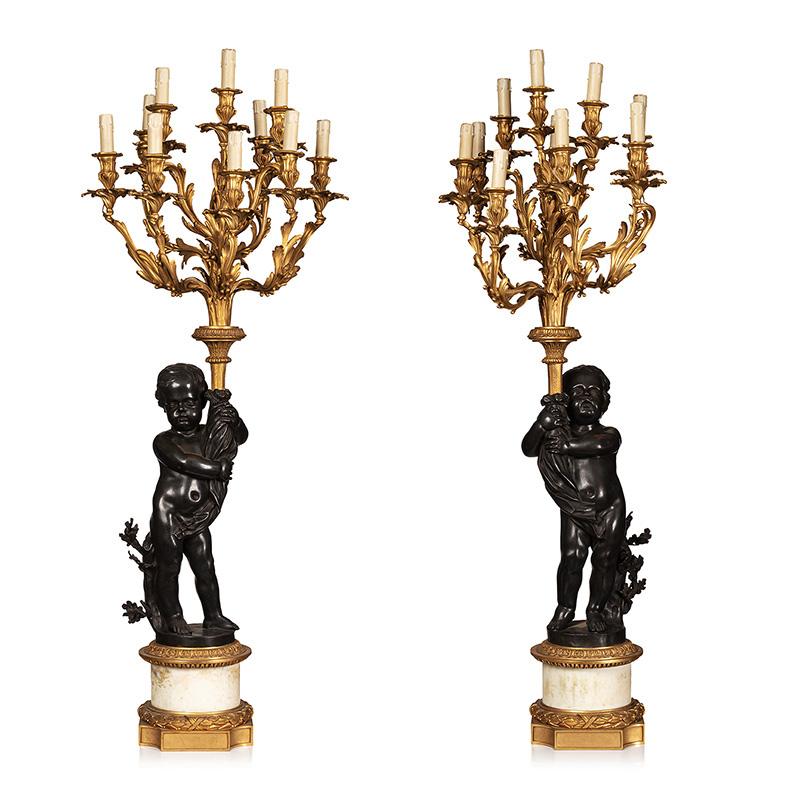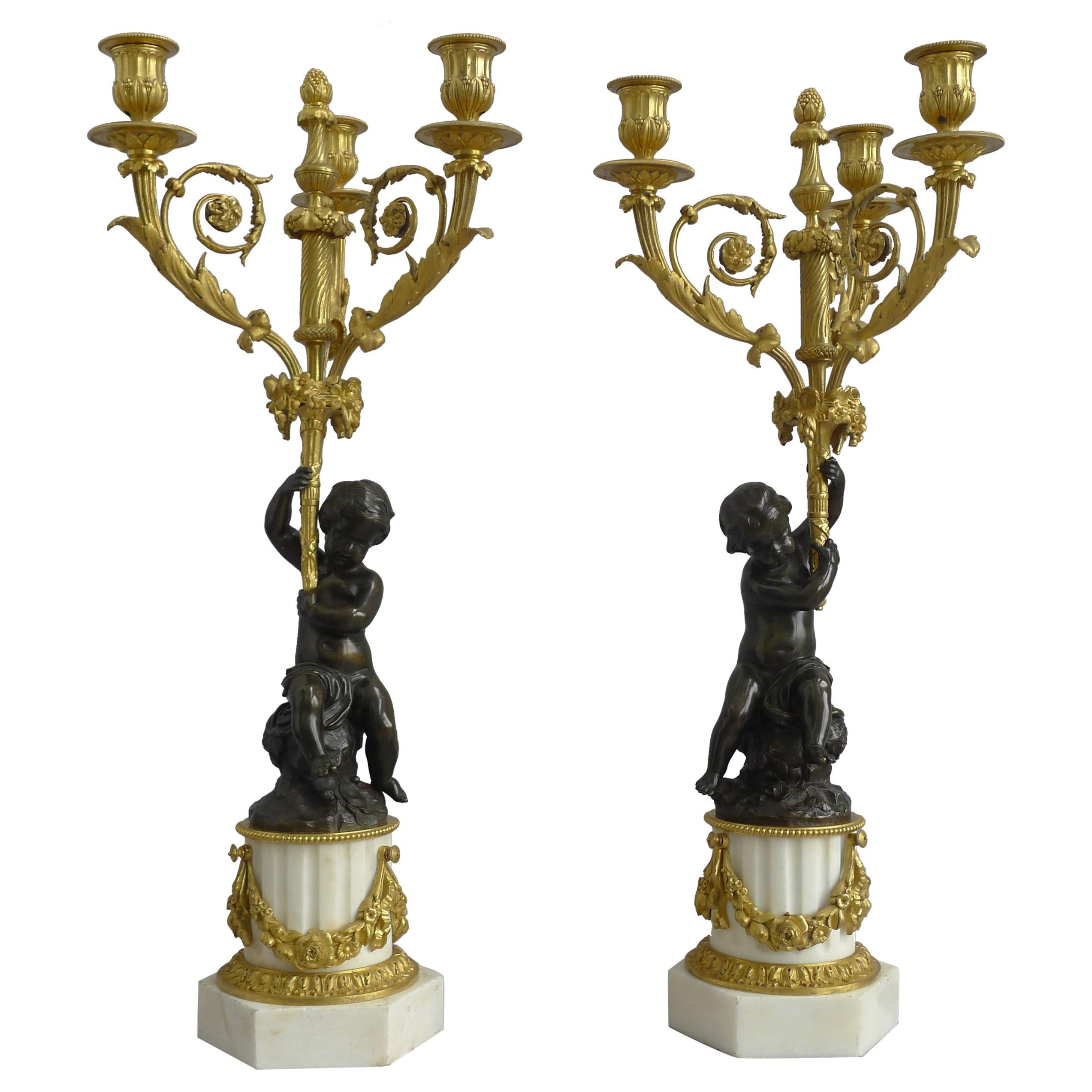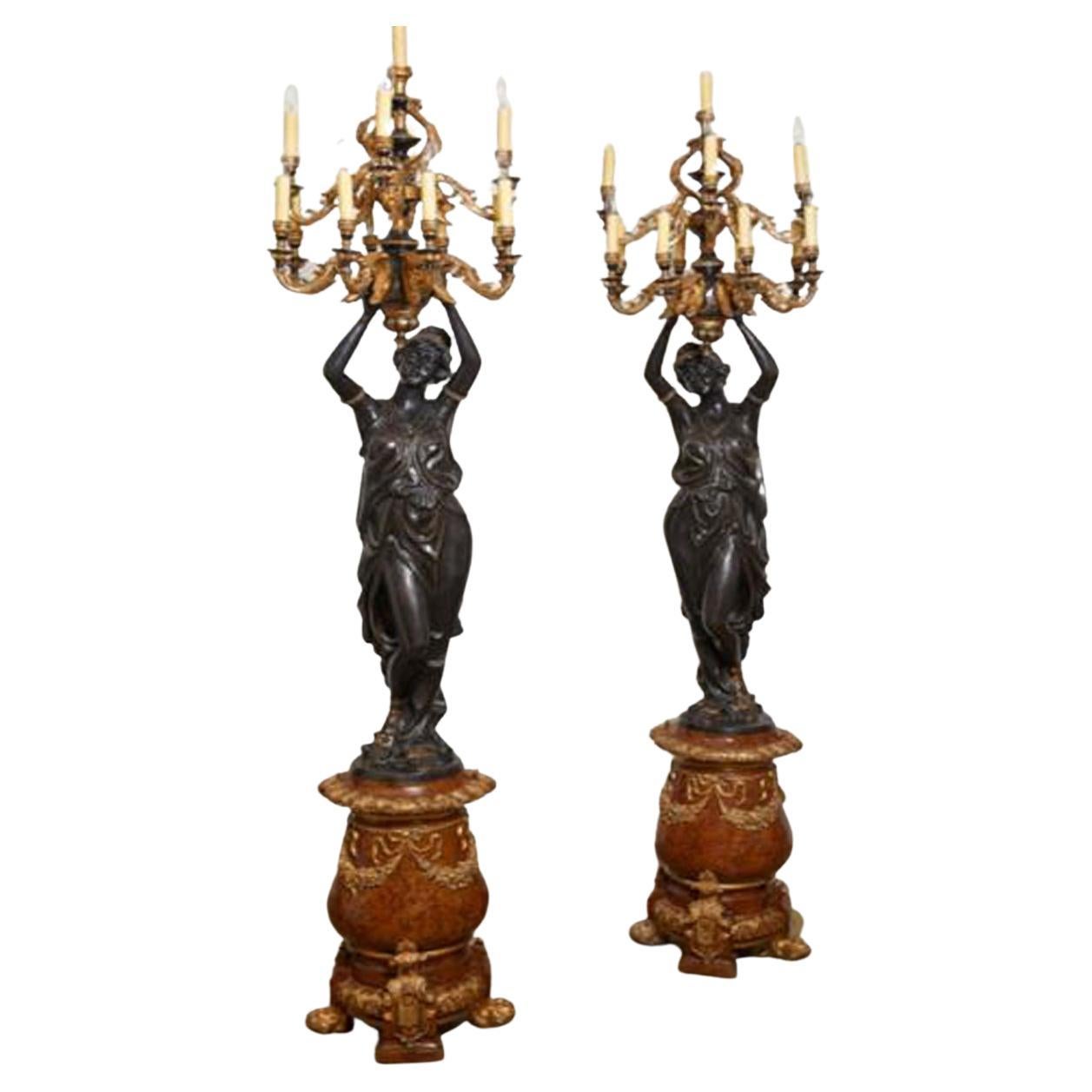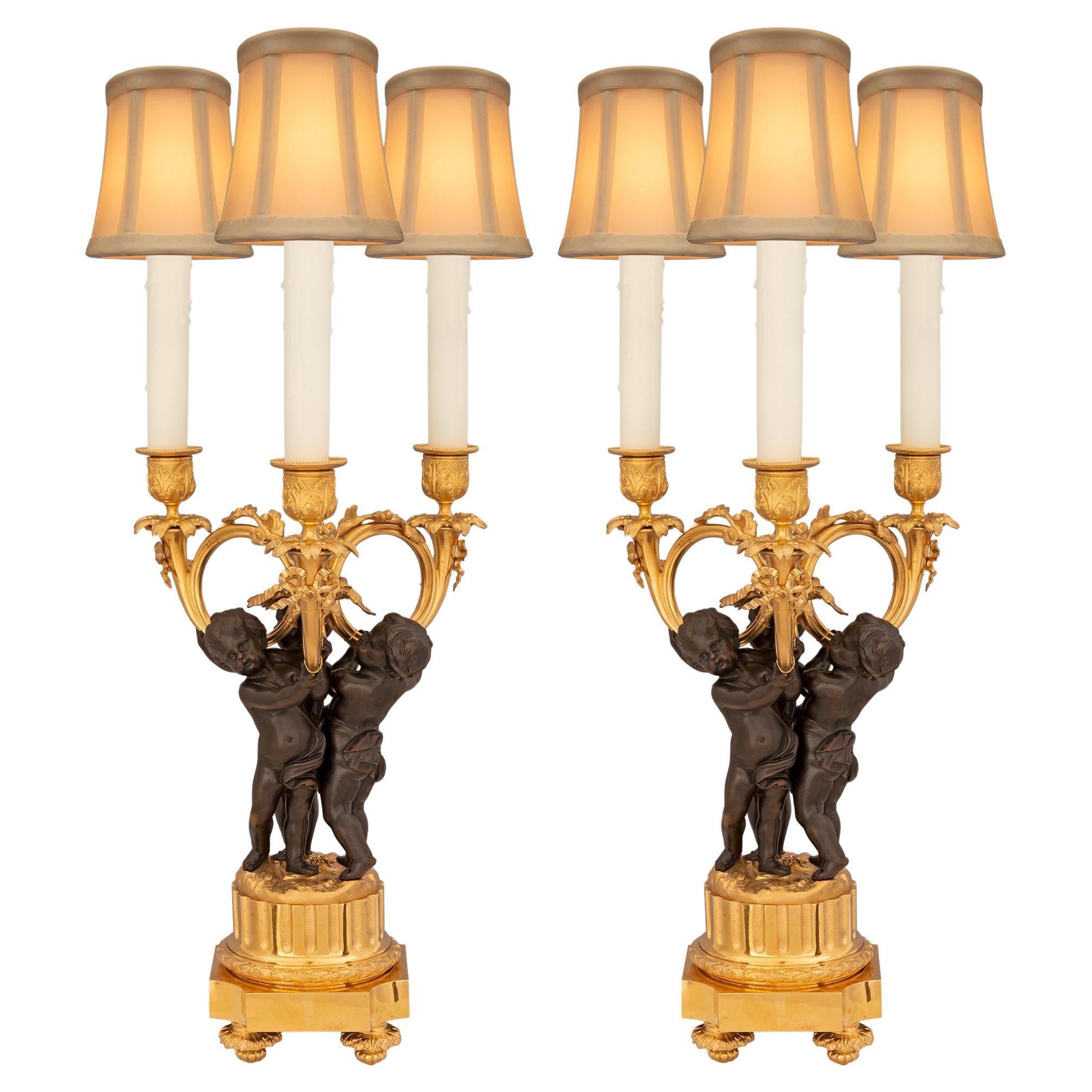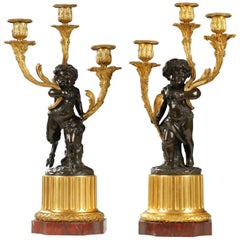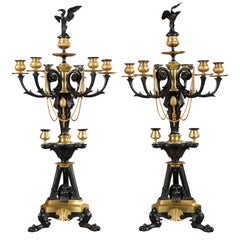Items Similar to Pair of Bronze Putti Torcheres Attributed to v. Paillard, France, Circa 1870
Want more images or videos?
Request additional images or videos from the seller
1 of 12
Pair of Bronze Putti Torcheres Attributed to v. Paillard, France, Circa 1870
$201,046.06per set
$454,747.04per set55% Off
£149,343.65per set
£337,801.11per set55% Off
€168,000per set
€380,000per set55% Off
CA$277,357.11per set
CA$627,355.37per set55% Off
A$304,891.78per set
A$689,636.16per set55% Off
CHF 160,237.13per set
CHF 362,441.12per set55% Off
MX$3,702,496.59per set
MX$8,374,694.66per set55% Off
NOK 1,998,917.93per set
NOK 4,521,361.99per set55% Off
SEK 1,893,834.17per set
SEK 4,283,672.54per set55% Off
DKK 1,278,903.04per set
DKK 2,892,756.87per set55% Off
About the Item
A pair of two patina bronze torcheres attributed to V. Paillard. Each modelled as a pair of putti holding aloft a large foliate shaft issuing eleven berried-acanthus scrolled branches terminating in conforming drip-pans and nozzles, on a circular plinth with fluted shaft.
Measures: Total height: 262 cm (103 in.)
Height of torcheres: 180 cm (70,8 in.); width : 75 cm (29,5 in.)
Height of base: 82 cm (32,3 in.); diameter of base: 52 cm (20,5 in.).
Many of Paillard’s bronze pieces are now displayed in private collections as well as in renowned fine arts museums, such in the Dahesh Museum of Art in New York, exhibiting Sappho (1851). In Paris, the “Quai d’Orsay” (French Foreign Office) still presents since the 1855’s some great pieces by Paillard (clocks, candelabra and torcheres) in the Main Hall, the Congress Hall and the Salon of the Ambassadors. As for its Clock Room, Paillard made the clock which gave its name to the Room.
Victor Paillard (1805-1886) was one of the most distinguished bronze casters in Paris during the second half of the 19th Century. He was taught chasing by Jean-François Denière (1774-1866), then opened in the 1830’s his own workshop making “Art bronzes and Furnishing bronzes”, settled n°105, boulevard Beaumarchais in Paris. He executed first small objects, then cast statuettes, candelabra, clocks as well as impressive sized torcheres. He appeared to the public for the first time at the Industrial Products Exhibition of 1839 and worked for the greatest French sculptors, such as Pradier, Barye and Carrier-Belleuse.
- Attributed to:Victor Paillard (Maker)
- Dimensions:Height: 103.15 in (262 cm)Diameter: 29.53 in (75 cm)
- Sold As:Set of 2
- Style:Napoleon III (Of the Period)
- Materials and Techniques:
- Place of Origin:
- Period:
- Date of Manufacture:circa 1870
- Condition:Wear consistent with age and use.
- Seller Location:PARIS, FR
- Reference Number:Seller: 1297/11stDibs: LU3860311774631
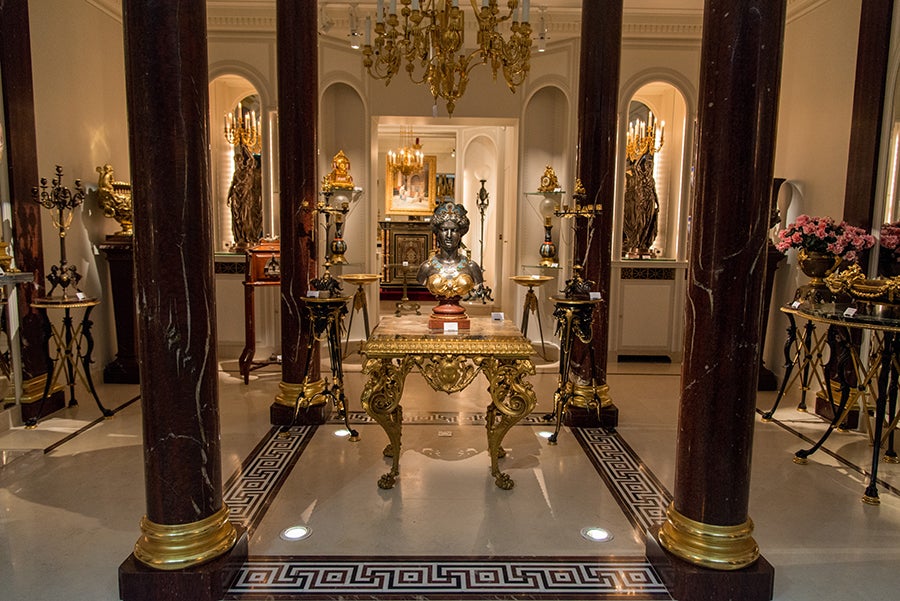
About the Seller
4.9
Vetted Professional Seller
Every seller passes strict standards for authenticity and reliability
Established in 1997
1stDibs seller since 2018
87 sales on 1stDibs
Typical response time: <1 hour
Associations
International Confederation of Art and Antique Dealers' Associations
- ShippingRetrieving quote...Shipping from: Saint Ouen, France
- Return Policy
Authenticity Guarantee
In the unlikely event there’s an issue with an item’s authenticity, contact us within 1 year for a full refund. DetailsMoney-Back Guarantee
If your item is not as described, is damaged in transit, or does not arrive, contact us within 7 days for a full refund. Details24-Hour Cancellation
You have a 24-hour grace period in which to reconsider your purchase, with no questions asked.Vetted Professional Sellers
Our world-class sellers must adhere to strict standards for service and quality, maintaining the integrity of our listings.Price-Match Guarantee
If you find that a seller listed the same item for a lower price elsewhere, we’ll match it.Trusted Global Delivery
Our best-in-class carrier network provides specialized shipping options worldwide, including custom delivery.More From This Seller
View All"Faun and Bacchus" Bronze Candelabras After Clodion, France, Circa 1880
By Claude Michel Clodion
Located in PARIS, FR
Pair of candelabras after a model by Clodion, representing a young Faun and a young Bacchus in patinated bronze, each holding three light-arms in chiseled and gilded bronze with vine...
Category
Antique 1880s French Louis XVI More Lighting
Materials
Griotte Marble, Bronze
$5,385 Sale Price / set
40% Off
Pair of Neo-Greek Bronze Candelabras Attributed to G.Servant, France, Circa 1870
By Georges Emile Henri Servant
Located in PARIS, FR
Rare pair of Greek style candelabras made in patinated bronze and gilded bronze, attributed to G. Servant. Each with ten light arms topped by a heron shaped extinguisher. Decorated with various Greek style motifs such palmets, pine cones ans water leaves. Standing on a small triangular architecture presenting a theatre mask and reposing on a tripod base formed with lion paw feet.
Georges Emile Henri Servant (circa 1828-1890), who took over his father in 1855 at their foundry, rue Vieille-du-Temple, in Paris, specialized in the production of neo-Egyptian style clocks, very popular in France since 1860’s, and also the making of Greek style decorative objects. He drew considerable attention to the high quality of his bronzes at the 1855 Paris Universal Exhibition and then at the 1862 London Exhibition. At this time Servant exported up to 40% of his production, principally to the United States, where for instance, his clocks were sold with great success by Louis Tiffany Inc. or Hamann & Roche of New York. But his success came really at the 1867 Paris Universal Exhibition, where he was awarded a Gold Medal for his neo-Greek and Egyptian works (Les Merveilles...
Category
Antique 1870s French Greek Revival Table Lamps
Materials
Bronze
$8,257 Sale Price / set
62% Off
Pair of Louis XIV Style Silvered Bronze Candelabras, France, Circa 1880
Located in PARIS, FR
Pair of Louis XIV style five-light candelabras. Chiseled and silvered bronze. Ornamented with palmettes, medallions and feminine masks. Central stem with guilloche motifs, resting on...
Category
Antique 1880s French Louis XIV Table Lamps
Materials
Bronze
Maison Millet, Pair of “ Tritons” Candelabras, France, Circa 1870
By Maison Millet, Pierre Gouthiere
Located in PARIS, FR
Height : 78 cm (30,7 in.) ; Base : 14,5 x 14,5 cm (5,7 in. x 5,7 in.)
Beautiful pair of Louis XVI style amphora-shaped vases in gilded bronze and "canon de fusil" patinated bronze a...
Category
Antique 1870s French Napoleon III Candelabras
Materials
Bronze
Pair of torcheres “Night” & “Day” model by Carrier-Belleuse & E.Colin, 19th C
By E. Colin & Cie 1, Albert-Ernest Carrier-Belleuse
Located in PARIS, FR
Total height : 257 cm (101,2 in.) ; Base height : 52 cm (20,5 in.) ; Base width : 48×48 cm (18,9×18,9 in.)
Exceptional pair of female torcheres, made in dark patinated bronze with g...
Category
Antique Late 19th Century French Napoleon III Floor Lamps
Materials
Marble, Bronze
Pair of Neo-Greek Floor Lamps Att. to Lacarrière, Delatour & Cie, France, C 1860
By Lacarrière, Delatour and Co.
Located in PARIS, FR
Measures : Height without globe: 188,5 cm (74,2 in.) ; Base : 45 x 45 cm (17,7 x 17,7 in.)
Pedestal height : 136 cm (53,5 in.)
Lamp height : 52 cm (20,4 in.)
Beautiful pair of neo-G...
Category
Antique 1860s French Greek Revival Floor Lamps
Materials
Griotte Marble, Bronze
You May Also Like
Pair of French Bronze Antique Putto Sculpture Candelabra Lamps, circa 1870-1890
Located in Shippensburg, PA
SUPERB PAIR OF DORÉ AND PATINATED BRONZE SEVEN-LIGHT CANDELABRA WITH PUTTO FIGURALS
France, circa 1870-1890
Item # 007LTX30A
An incredibly fine pair of ...
Category
Antique 19th Century French Table Lamps
Materials
Bronze
Pair of Monumental French Napoleon III Style Patinated Thirteen-Light Torchères
Located in Los Angeles, CA
A pair of large French Napoleon III style metal thirteen-light figural torchières.depicting two winged cherubs holding up a thirteen-light torchère, standing on bases with gold highl...
Category
20th Century French Napoleon III Floor Lamps
Materials
Metal
Huge pair of torcheres figurative, bronze and marble
Located in Los Angeles, CA
Huge pair of torcheres figurative bronze and marble representative cherub surmonted by candelabras nine lights, the base are in giltwood and marble
this set is of a very high qual...
Category
Antique 1880s French Napoleon III Torchères
Materials
Marble, Bronze
$65,000 / set
Pair of Large French Figural Candelabra in Patinated Bronze, Ormolu and White Ma
Located in London, GB
A fine true pair of patinated bronze, ormolu and white marble figural candelabra in excellent condition. Set upon a white marble base, with ormolu swags surrounding the marble. The p...
Category
Antique 1840s French Napoleon III Candelabras
Materials
Marble, Bronze
Pair 19th Century Monumental Ormolu, Patinated Bronze Thirteen-Light
By Albert-Ernest Carrier-Belleuse
Located in Dublin 8, IE
Both are modelled as robed female figures holding aloft thirteen scrolled candlearms, on marbleized bronze plinths hung with ribbons and fruiting garlands, on pawfeet. After Albert-E...
Category
Antique Mid-19th Century European Victorian Floor Lamps
Materials
Bronze, Ormolu
Pair of French 19th Century Louis XVI St. Patinated Bronze and Ormolu Lamps
Located in West Palm Beach, FL
A striking and very high quality pair of French 19th century Louis XVI st. Belle Époque period patinated bronze and ormolu lamps. Each three arm lamp is raised by elegant foliate top...
Category
Antique 19th Century Table Lamps
Materials
Bronze, Ormolu
More Ways To Browse
French Torchere
French Napoleon Lamp
Gilt Bronze Patinated Lamp
Bronze Torchere
Fluted Plinth
Gilt Bronze Floor Lamp
Antique Lamps 1870
Antique Torcheres Floor Lamp
Putti Lamp
Bronze Putti Lamps
French Bronze Putti Lamp
Mid Century Floor Lamp Marble Base
Metal And Wood Floor Lamp
Mid Century Floor Lamp Red
Torchiere Floor Lamps
Palm Tree Furniture
Vintage German Floor Lamps
Danish Floor Lamp Mid Century
